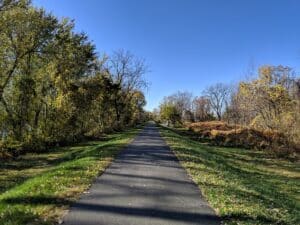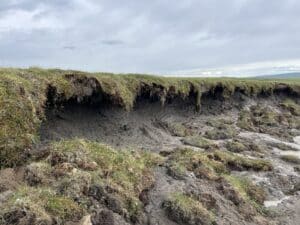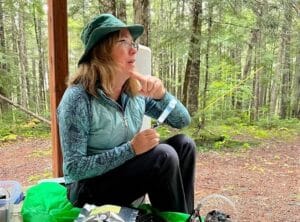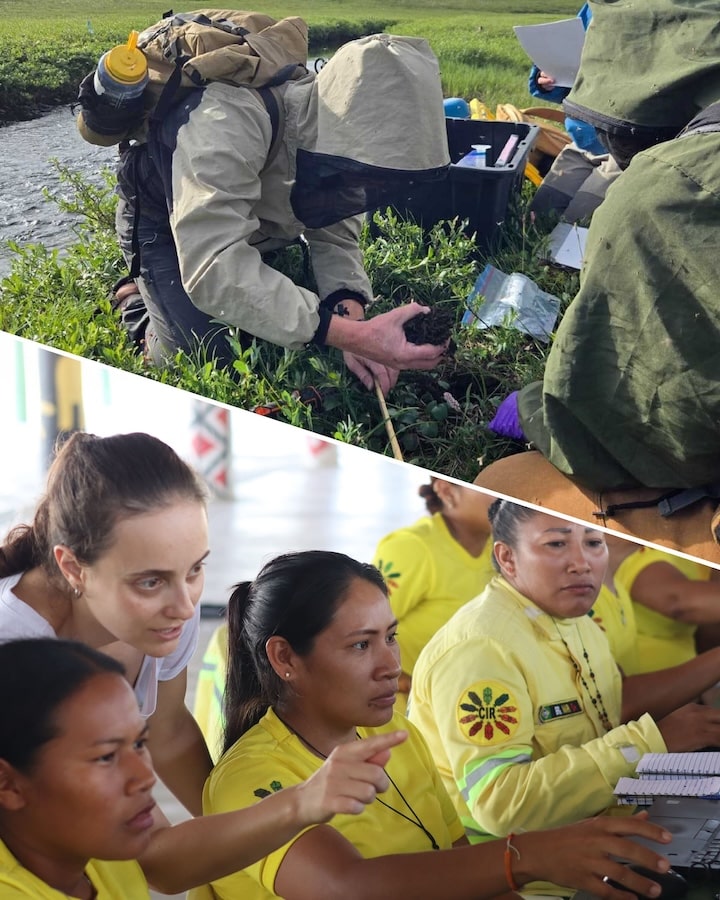From New Zealand to New York, people and communities are moving to avoid climate disasters

In the face of floods, wildfires and other natural disasters, when should a community relocate to avoid potential harm?
This month’s Nature Quest is about that very question. Listener Molly Magid in New Zealand wanted to know if and how other communities have chosen the path of “managed retreat.” That’s the purposeful and coordinated movement of people and assets out of harm’s way.
From the Amazon to the Congo Basin, the largest remainder of tropical forest lies in Brazil and the Democratic Republic of Congo – taking up nearly 4 million square miles of land. As epicenters of biodiversity and carbon storage, these forests serve as the stabilizers of our climate. Yet many tropical forests around the world are disappearing as climate change and human activity drive deforestation every year.
Despite covering only 6% of the planet, tropical forests play a critical role in climate control. They prevent atmospheric warming by storing carbon, dispersing heat, releasing cooling water into the air, and helping to create clouds. They also help regulate air quality, soil health, and the water cycle. Keeping them standing is one of our best natural climate solutions.
At the 2021 United Nations Climate Change Conference (COP26), over 100 world leaders pledged to halt and reverse forest loss and land degradation by 2030, but deforestation has continued year over year. Under our current economic system, forests are often more valuable cut and cleared than left standing.
But this year, a new solution has appeared on the horizon: a fund to incentivize tropical forest conservation.
The tropical deforestation crisis
In 2024, the tropics lost 6.7 million hectares of primary forest – old forest that has been relatively undisturbed by humans – at a rate of 18 soccer fields per minute. It was a record-breaking year for primary forest loss and the fastest rate of primary forest deforestation on record, with much of the increase driven by wildfire.
Bolivia and the Democratic Republic of the Congo saw some of the highest levels of primary forest loss on record. But Brazil, the world’s largest tropical forest nation and home to over half of the Amazon rainforest, took the biggest hit. Over 40% of all tropical primary forest loss in 2024 occurred in Brazil.
The main forces behind forest loss worldwide are all human activities: agricultural expansion, mining, logging, and infrastructure development. Dr. Ludmila Rattis, Assistant Scientist and General Coordinator of Woodwell’s Tanguro Field Station, works on the Brazilian agricultural frontier to understand the impacts of agricultural intensification.
“Today, the number one driver of deforestation in the Amazon and Cerrado is land grabbing,” Rattis says.
Land grabbing refers to the control and clearing of large plots of land by a person or entity without clear rights to do so. In Brazil, land grabbing has been common since colonial times, when legislation restricted access to land. Today, nearly 50 million hectares of public forest in the Brazilian Amazon remains “undesignated” – meaning the land has not been formally designated by the government for a specific purpose – which leaves it highly vulnerable to grabbing.
Brazil is a major producer of agricultural commodities including beef, soybeans, and coffee. Because the country has a large amount of undesignated land with unclear regulations, land grabbing for agricultural production is profitable – and cleared forests are more financially valuable than standing ones. Brazilian law also allows the legal deforestation of some trees on private property, as long as 80% of forests on the property remain standing.
In late 2023, the Brazilian government proposed the Tropical Forest Forever Facility (TFFF) as a new financial solution that would pay tropical countries to keep their forests standing. Designed to generate and distribute $4 billion each year, it would complement other sources of finance by focusing incentives on forest conservation.
How does the TFFF work?
The TFFF is a global investment fund that proposes to use finance and investment strategies to generate annual payments to tropical forest countries that conserve and restore their forests. First introduced at COP28, the fund would provide tropical forest nations with large-scale, predictable payments based on how much forest cover they maintain.
The fund will raise money from both the public and private sectors, starting with $125 billion – $25 billion from government sponsors in long-term loans and guarantees and $100 billion from long-term, low-interest bond sales to private sector investors. The money raised will be invested into bonds with a high rate of return to generate revenue. Part of the revenue will be used to pay down interest on loans from bond-holders and government sponsors, with the remaining earnings being allocated to fund annual payments to tropical forest nations.
Frances Seymour, Senior Policy Advisor at Woodwell, is working on forest finance priorities leading up to COP30 this year.
“The innovative feature is the use of public capital to reduce the risk of non-repayment to private investors,” Seymour says.
The return generated by the fund would be paid out to eligible tropical forest countries at an initial rate of $4 per hectare of forest. It would be distributed to eligible governments with a deduction applied for every hectare deforested or degraded.
In order to be eligible for the fund, a country must be a developing nation with tropical or subtropical broadleaf moist forests – forests characterized by year-round warmth, high levels of precipitation, and trees with broad, flat leaves. Additionally, the deforestation rate during the year the country adheres to the TFFF must be lower than the previous year.
To track deforestation rates, participating nations would need to use remote sensing technologies such as satellite imagery. For example, Brazil’s National Institute for Space Research (INPE) monitors tree cover loss using satellite-based systems. Countries that do not have the ability to monitor their own forests would be allowed to use approved third-party methods and data.
How many trees make a forest?
Areas eligible for forest payments must also have more than 20% canopy cover, which refers to the percentage of the upper layer of trees in a forest that obscures light passing through. But some people argue that the proposed threshold isn’t high enough.
Scientists at Woodwell Climate, including Associate Scientist Glenn Bush and Research Assistant Patrick Fedor, are pushing for higher canopy cover thresholds for the fund.
“The problem is that most of us who work in tropical forests and know them well would say that a patch of land which only has 20% of forest cover isn’t a forest anymore – it’s a field,” Bush says.
A landscape with a few large trees scattered around may have canopies that register at 20% cover despite no longer functioning as a forest. Scientists recommend increasing the canopy cover threshold to 60% or even 80% to focus on high-value intact tropical forest areas and prevent cleared areas from qualifying for TFFF benefits.
In a memo to TFFF Secretariat Andre Aquino, Bush and Fedor assessed management costs and social benefits of conserving tropical forests in Brazil and the DRC. They found that with raised canopy thresholds and adjusted payments, the TFFF could help protect more biodiverse and climate resilient forests without increasing the fund’s total budget. The counter argument, however, is that any forests below the increased threshold may face a higher risk of being permanently converted to another use rather than restored if not included in the scheme.
“The biggest thing is to increase canopy cover because we want resilient forests,” Fedor says. “We’re trying to keep forests fully intact.”
COP30 and the future of tropical forests
While the specifics of the fund aren’t fully agreed upon, the general consensus is that the global effort would make a significant positive change for tropical forest nations. By providing a source of predictable budget support for forest conservation and management, tropical forest nations could bring environmental goals to the forefront of government policy and action.
“This is a really long-term commitment to what could be potentially transformational change,” Bush says.
If successful, the model has the potential to apply to other efforts beyond forest conservation. The TFFF model, Seymour says, could be replicated to finance efforts such as girls’ education or eradicating malaria, two areas that are facing pressures from recent reductions in development aid from wealthy countries.
The proposed TFFF model also puts an emphasis on Indigenous communities and their contribution to forest conservation by requiring a minimum of 20% of annual payments to each country – a global amount totalling at least $800 million annually – to be allocated to Indigenous and local forest communities.
“The focus on Indigenous Peoples and reinforcing land rights is really critical,” Bush says. “That’s the first time a fund of this sort has actually involved Indigenous Peoples groups in its design in such an early stage.”
Research has shown that Indigenous communities are the key to protecting tropical forests. Managing over half of the world’s remaining intact forests, Indigenous tropical forest communities experience more carbon capture, less carbon loss, and less tree cover loss than other lands. When Indigenous land rights are enforced, forests thrive.
“It’s an innovative policy that’s hopefully going to promote good change and good environmental outcomes,” Fedor says. “It changes the economics of a forest’s value.”
During New York Climate Week in September, Brazilian President Luiz Inácio Lula da Silva announced that Brazil itself would invest $1 billion in sponsor capital, challenging other governments to do their part as well. The Brazilian government plans to formally launch TFFF at COP30 in Belém, Brazil in November. With the world’s biggest climate event hosted in the world’s biggest tropical forest nation, tropical forests will feature heavily on the international agenda. Roughly 45,000 policymakers, government negotiators, scientists, activists, and Indigenous leaders will be descending on the city at the mouth of the Amazon, placing a major spotlight on one of the very regions the TFFF is designed to protect.
“If there were ever a moment when a big idea like this could get the political and financial support that it needs to get off the ground,” Seymour says, “this is it.”
Behind the levee: The forgotten communities at risk in Massachusetts

Catherine Gonzalez knows the water always wins.
She remembers being 5, riding on her father’s shoulders as he trudged through chest-high water to escape to higher ground in Santa Isabel, Puerto Rico. As Hurricane Hortense barreled through in September 1996, the river overflowed its banks, taking her home and belongings, but thankfully not her family. Others weren’t as fortunate. After 20 inches of rain, flash flooding, and mudslides, at least 18 people were dead.
In the wake of the devastation, Gonzalez and her family followed relatives to Chicopee, a town defined by its relationship to two rivers – the Chicopee and the Connecticut. A place less prone to hurricanes. A place that was supposed to be safe. But Gonzalez worries it brings dangers of its own.
Read more on The Boston Globe.
Permafrost thawed by climate change threatens remote villages in Alaska

In the Arctic tundra of Alaska, climate change is forcing an Alaska Native village to relocate. Rising temperatures are melting the underground permafrost. The melted ice then mixes with the soil, creating unstable land the Yupʼik people call Alaskan quicksand. Amalia Huot-Marchand and a team from the Medill School of Journalism report.
Woodwell Climate Research Center is thrilled to announce the receipt of a $10 million unrestricted gift from renowned philanthropist MacKenzie Scott. At a time when scientific institutions across the United States are facing unprecedented challenges, this generous gift will support the long-term financial strength of the Center and its critical mission of conducting groundbreaking research to drive science-based solutions to the climate crisis.
Over the past three years, MacKenzie Scott has supported the Center’s Permafrost Pathways initiative through the TED Audacious Project. This new gift builds upon that tremendous support and makes it possible for the Center to leverage critical funds throughout the Center’s work across the globe.
“In a moment where climate science is under attack, this support strengthens our resolve and bolsters our confidence to act boldly and pursue our most innovative ideas,” said Dr. Max Holmes, President and CEO of Woodwell Climate. “An unrestricted gift of this size is extraordinary, and stands as a ringing endorsement of Woodwell’s mission and values from one of the world’s most influential philanthropists. We are deeply inspired by and grateful for this act of generosity and the remarkable trust it shows in our vision and impact.”
For forty years Woodwell Climate has pursued the critical work of scientific research to help leaders and communities across the country—and around the world—curb climate change and cope with the increasingly damaging impacts. With this key investment, Woodwell will continue and accelerate efforts to find climate solutions, intensify its commitment to the highest standard of science, and aspire to ever greater courage and creativity.
To meet pledges to save forests spending must triple, U.N. report says
Four years after a global pledge to end deforestation, the amount of money going toward conserving and restoring forests is not enough, the analysis found.

Nations are not spending enough to ensure that the forests that cover nearly a third of the planet remain healthy, according to a new United Nations report. To meet various international climate, biodiversity and land restoration goals, annual global spending needs to triple to $300 billion by 2030, the report found.
Forests are the “quintessential definition of a public good,” because of the benefits they provide, said Gabriel Labbate, who leads the climate mitigation unit at the U.N. Environmental Program and is one of the lead authors of the analysis.
Read more on The New York Times.
The impacts of climate change on the frequency and severity of physical hazards are putting many communities at risk. As the threat of climate change grows, so too does the need for accessible information, tools, and expertise to support climate-resilient decision making across multiple scales, from communities to countries. Woodwell Climate Research Center believes there is a need to localize and customize climate risk assessments. This information is critical for local government leaders as they make planning decisions, but it is not available to all communities. Woodwell believes that this science should be freely and widely available. To address this gap, Woodwell works with communities across the world, including Louisville, KY, to provide community climate risk assessments, free of charge. This report was generated in partnership with the Louisville Metropolitan Sewer District (Louisville MSD), so we have focused this analysis within the geographic area of Jefferson County, KY.
How can we help scientists tell their stories?
Science has a communication problem. This week on Possibly we’re taking a look at an audio-storytelling organization, called Transom, that’s trying to help fix it.

Welcome to Possibly. Where we take on huge problems, like the future of our planet, and break them down into small questions with unexpected answers. I’m Megan Hall.
Science has a communication problem. It can be hard for everyday people to understand what scientists are saying about their research..
Juliana Merullo and Nat Hardy are here to tell us about a science storytelling workshop trying to help solve this problem.
Read more or listen on Possibly.




